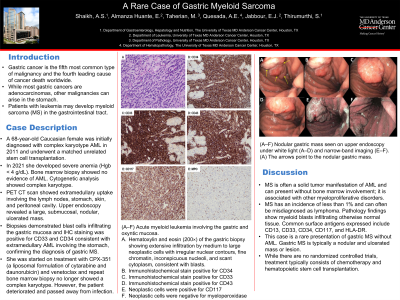Monday Poster Session
Category: Stomach
P2771 - A Rare Case of Gastric Myeloid Sarcoma
Monday, October 23, 2023
10:30 AM - 4:15 PM PT
Location: Exhibit Hall

Has Audio
- AS
Abdullah S. Shaikh, MD
University of Texas MD Anderson Cancer Center
Houston, TX
Presenting Author(s)
Abdullah S. Shaikh, MD, Emmanuel Almanza Huante, MD, Mehran Taherian, MD, Andres Ernesto Quesada, MD, Elias Joseph Jabbour, MD, Selvi Thirumurthi, MD
University of Texas MD Anderson Cancer Center, Houston, TX
Introduction: Gastric cancer is the fifth most common type of malignancy and the fourth leading cause of cancer death worldwide. While the majority of gastric cancers are adenocarcinomas, other malignancies such as gastrointestinal stromal tumors, mucosa-associated lymphoid tissue lymphomas, and leiomyosarcomas can arise in the stomach. In addition, patients with leukemia may develop myeloid sarcoma (MS) in the gastrointestinal tract.
Case Description/Methods:
Our patient is a 68-year-old Caucasian female who was initially diagnosed with complex karyotype AML in 2011 and underwent a matched unrelated stem cell transplantation. In 2021 she developed severe anemia (Hgb < 4 g/dL). Bone marrow biopsy showed no evidence of AML by immunohistochemistry and flow cytometry. Cytogenetic analysis showed complex karyotype. PET CT scan showed extramedullary uptake involving the lymph nodes, stomach, skin, and peritoneal cavity. Upper endoscopy was performed and showed a large, submucosal, nodular, ulcerated mass. Biopsies demonstrated blast cells infiltrating the gastric mucosa and IHC staining was positive for CD33 and CD34 consistent with extramedullary AML involving the stomach, confirming the diagnosis of gastric MS.
She was treated with CPX-351 (a liposomal formulation of cytarabine and daunorubicin) and venetoclax and repeat bone marrow biopsy no longer showed a complex karyotype. The gastric mass was significantly smaller on repeat imaging and upper endoscopy. The patient continued to receive chemotherapy in preparation for second bone marrow transplant and initially there was partial response. However, the patient deteriorated and passed away from infection.
Discussion: MS is often a solid tumor manifestation of AML and can present without bone marrow involvement; it is associated with other myeloproliferative disorders. It has an incidence of less than 1% and can often be misdiagnosed as lymphoma. It appears the more common sites of presentation include the skin, soft tissues, bone, lymph nodes, and periosteum. Gastrointestinal involvement is uncommon and usually involves the small intestine.
This case is a rare presentation of gastric MS without AML. Gastric MS is typically a nodular and ulcerated mass or lesion. Pathology findings show myeloid blasts infiltrating otherwise normal tissue. Common surface antigens expressed include CD13, CD33, CD34, CD117, and HLA-DR. While there are no randomized controlled trials, treatment typically consists of chemotherapy and hematopoietic stem cell transplantation.

Disclosures:
Abdullah S. Shaikh, MD, Emmanuel Almanza Huante, MD, Mehran Taherian, MD, Andres Ernesto Quesada, MD, Elias Joseph Jabbour, MD, Selvi Thirumurthi, MD. P2771 - A Rare Case of Gastric Myeloid Sarcoma, ACG 2023 Annual Scientific Meeting Abstracts. Vancouver, BC, Canada: American College of Gastroenterology.
University of Texas MD Anderson Cancer Center, Houston, TX
Introduction: Gastric cancer is the fifth most common type of malignancy and the fourth leading cause of cancer death worldwide. While the majority of gastric cancers are adenocarcinomas, other malignancies such as gastrointestinal stromal tumors, mucosa-associated lymphoid tissue lymphomas, and leiomyosarcomas can arise in the stomach. In addition, patients with leukemia may develop myeloid sarcoma (MS) in the gastrointestinal tract.
Case Description/Methods:
Our patient is a 68-year-old Caucasian female who was initially diagnosed with complex karyotype AML in 2011 and underwent a matched unrelated stem cell transplantation. In 2021 she developed severe anemia (Hgb < 4 g/dL). Bone marrow biopsy showed no evidence of AML by immunohistochemistry and flow cytometry. Cytogenetic analysis showed complex karyotype. PET CT scan showed extramedullary uptake involving the lymph nodes, stomach, skin, and peritoneal cavity. Upper endoscopy was performed and showed a large, submucosal, nodular, ulcerated mass. Biopsies demonstrated blast cells infiltrating the gastric mucosa and IHC staining was positive for CD33 and CD34 consistent with extramedullary AML involving the stomach, confirming the diagnosis of gastric MS.
She was treated with CPX-351 (a liposomal formulation of cytarabine and daunorubicin) and venetoclax and repeat bone marrow biopsy no longer showed a complex karyotype. The gastric mass was significantly smaller on repeat imaging and upper endoscopy. The patient continued to receive chemotherapy in preparation for second bone marrow transplant and initially there was partial response. However, the patient deteriorated and passed away from infection.
Discussion: MS is often a solid tumor manifestation of AML and can present without bone marrow involvement; it is associated with other myeloproliferative disorders. It has an incidence of less than 1% and can often be misdiagnosed as lymphoma. It appears the more common sites of presentation include the skin, soft tissues, bone, lymph nodes, and periosteum. Gastrointestinal involvement is uncommon and usually involves the small intestine.
This case is a rare presentation of gastric MS without AML. Gastric MS is typically a nodular and ulcerated mass or lesion. Pathology findings show myeloid blasts infiltrating otherwise normal tissue. Common surface antigens expressed include CD13, CD33, CD34, CD117, and HLA-DR. While there are no randomized controlled trials, treatment typically consists of chemotherapy and hematopoietic stem cell transplantation.

Figure: Retroflexed view of myeloid sarcoma presenting as a gastric mass.
Disclosures:
Abdullah Shaikh indicated no relevant financial relationships.
Emmanuel Almanza Huante indicated no relevant financial relationships.
Mehran Taherian indicated no relevant financial relationships.
Andres Ernesto Quesada indicated no relevant financial relationships.
Elias Joseph Jabbour indicated no relevant financial relationships.
Selvi Thirumurthi indicated no relevant financial relationships.
Abdullah S. Shaikh, MD, Emmanuel Almanza Huante, MD, Mehran Taherian, MD, Andres Ernesto Quesada, MD, Elias Joseph Jabbour, MD, Selvi Thirumurthi, MD. P2771 - A Rare Case of Gastric Myeloid Sarcoma, ACG 2023 Annual Scientific Meeting Abstracts. Vancouver, BC, Canada: American College of Gastroenterology.
